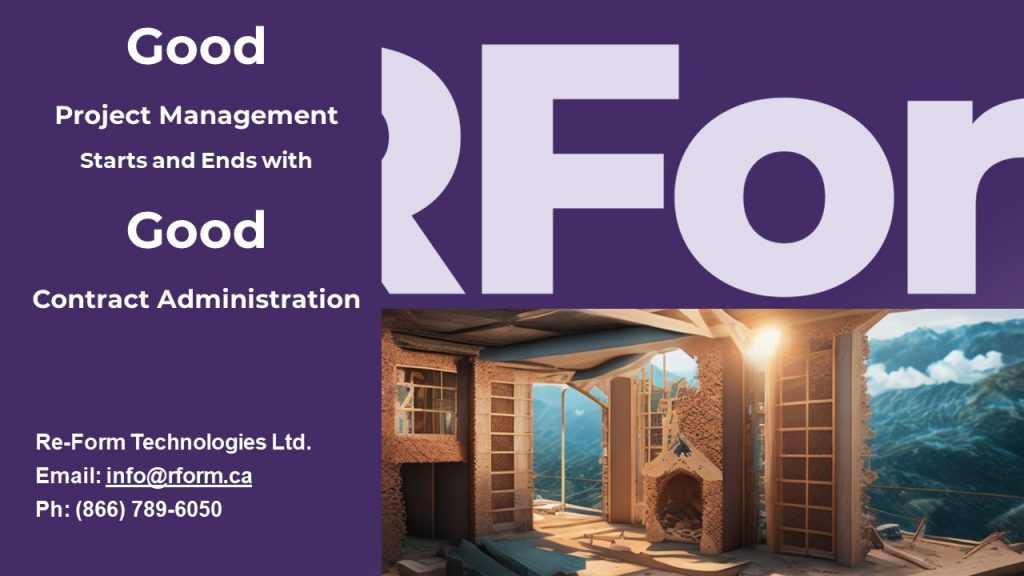Good Project Management Starts and Ends with Good Contract Administration

In project management, success hinges upon effective contract administration. Good project management starts and ends with good contract administration, as it sets the foundation for a well-executed project. Contract administration ensures project success, from establishing clear expectations and deliverables to managing costs and risks.
Access Contract Administration Best Practices with Our Free Ebook
The Importance of Contract Administration in Project Management: Contract administration is a crucial aspect of project management because it establishes the terms and conditions under which a project will be executed. It involves reviewing, interpreting, and implementing the provisions outlined in the contract. This includes understanding the project scope, deliverables, timelines, and budget.
By thoroughly understanding the contract, project managers can set realistic expectations and ensure the project aligns with the client’s objectives. This not only helps in managing client relationships but also ensures that the project team has a clear understanding of their roles and responsibilities.
Additionally, proper contract administration allows project managers to identify and manage risks effectively. Proactively addressing potential issues can mitigate risks and minimize the chances of disputes or delays. This ultimately leads to smoother project execution and increased client satisfaction.
RForm offers a Contract Administration software solution specifically designed to streamline the complexities of project management. Key features include:
- Centralized Contract Repository: This repository stores all project contracts in a secure, easily accessible location, enhancing document control and streamlining collaboration.
- Automated Change Orders and Payment Processes: This simplifies the management of change orders, payments, and value schedules, reducing errors and saving time.
- Real-time Reporting and Analytics: Provides dashboards and reporting tools that give project managers greater visibility into contract performance, budget tracking, and risk identification.
Key Elements of a Contract Administration Process: A comprehensive contract administration process consists of several key elements that ensure effective management of the project contract. These elements include:
- Contract Review: Thoroughly review the contract to clearly understand the project scope, deliverables, timelines, and budget. This involves identifying any ambiguities or potential gaps that may require clarification or negotiation.
- Record-Keeping: Maintaining accurate and detailed records of all contract-related communications, changes, and decisions. This includes documenting meeting minutes, emails, and other relevant documentation to provide a clear audit trail.
- Communication: Establishing effective communication channels with all project stakeholders, including the client, project team, and subcontractors. Regular communication ensures that everyone is aligned and informed about any changes or updates to the project.
- Timely Decision-Making: Making informed and timely decisions throughout the project lifecycle. This includes addressing change requests, resolving disputes, and approving project milestones to ensure project progress and avoid delays.
- Risk Management: Proactively identifying, assessing, and mitigating risks associated with the project. This involves developing risk mitigation strategies and contingency plans to minimize the impact of potential risks on project delivery.
By incorporating these key elements into the contract administration process, project managers can effectively manage the project contract and ensure successful project outcomes.
Benefits of Effective Contract Administration in Project Management: Effective contract administration offers numerous benefits to project managers and clients. These benefits include:
- Clear Expectations: Establishing clear expectations and deliverables from the outset helps contract administration prevent misunderstandings and ensures that all parties are aligned. This leads to smoother project execution and minimizes the chances of disputes or delays.
- Cost Control: Proper contract administration allows project managers to monitor and control project costs closely. Project managers can prevent cost overruns by tracking expenses, managing change requests, ensuring accurate invoicing and ensuring the project stays within budget.
- Risk Mitigation: Contract administration helps identify and mitigate potential risks before they escalate through proactive risk management. This minimizes risks’ impact on project delivery and protects the interests of all parties involved.
- Improved Client Satisfaction: Effective contract administration ensures the project meets client expectations and objectives. By delivering on time and within budget, project managers can enhance client satisfaction and build strong, long-lasting relationships.
- Enhanced Project Efficiency: Proper contract administration streamlines project processes and reduces inefficiencies. Project managers can improve project efficiency and productivity by establishing clear communication channels, documenting decisions, and maintaining accurate records.
RForm software offers several benefits to bolster an effective contract administration process:
- Streamlined Communication: Facilitates communication between all stakeholders through a centralized platform, with real-time notifications and audit trails.
- Enhanced Risk Mitigation: Prevents costly errors or delays through document control, proactive risk identification tools, and reporting.
- Boosted Efficiency: Automates routine and time-consuming administrative tasks, freeing up project managers to focus on critical decision-making.
Common Challenges in Contract Administration: Contract administration is crucial to project success but has challenges. Some common challenges in contract administration include:
- Complexity: Contracts can be complex and contain legal jargon that may be difficult for project managers to understand. This requires careful review and interpretation to ensure compliance.
- Scope Creep: Changes in project scope can lead to contract variations and additional work. Managing scope creep requires effective communication and a clear change control process.
- Disputes and Claims: Disputes and claims may arise during the project lifecycle. Contract administration involves resolving these disputes fairly and on time to minimize project disruptions.
- Contract Changes: Changes to the contract may be necessary due to unforeseen circumstances or evolving project requirements. Managing contract changes requires proper documentation, communication, and negotiation skills.
- Contractor Performance: Ensuring contractors and subcontractors perform according to the contract requirements can be challenging. Contract administration involves monitoring and managing contractor performance to maintain project quality and schedule.
By being aware of these common challenges, project managers can proactively address them and minimize their impact on project delivery.
Best Practices for Successful Contract Administration: Project managers should follow best practices that enhance efficiency and mitigate risks to ensure successful contract administration. Some key best practices include:
- Thorough Contract Review: Carefully review the contract to understand its provisions, terms, and conditions. This includes identifying any ambiguities or gaps that may require clarification or negotiation.
- Effective Communication: Establish clear communication channels with all project stakeholders to ensure everyone is informed and aligned. Regular communication helps manage expectations, address concerns, and maintain transparency.
- Proactive Risk Management involves identifying potential risks and developing strategies to mitigate them. This involves conducting risk assessments, developing contingency plans, and monitoring risks throughout the project lifecycle.
- Accurate Record-Keeping: Maintaining detailed records of all contract-related communications, changes, and decisions. This provides a clear audit trail and helps resolve disputes or address claims.
- Change Control Process: Implementing a structured change control process to manage scope creep and contract variations. This involves documenting change requests, assessing their impact, and obtaining approvals.
- Regular Contract Reviews: Periodically review the contract to ensure compliance and make any necessary updates or amendments. This helps adapt to changing project requirements and minimize disputes.
By following these best practices, project managers can streamline the contract administration process and ensure optimal project outcomes.
The Role of Contract Administrators in Project Management: Contract administrators play a crucial role in project management by overseeing the contract administration process. They are responsible for ensuring compliance with contract terms, managing contract changes, and resolving disputes. Some key responsibilities of contract administrators include:
- Contract Review and Interpretation: Thoroughly review the contract to understand its provisions and ensure compliance. Contract administrators interpret and communicate contract requirements to all project stakeholders.
- Change Management: Managing contract changes and variations through proper documentation, negotiation, and approval processes. Contract administrators ensure that changes are properly assessed, documented, and communicated to all relevant parties.
- Dispute Resolution: Resolving contract-related disputes and claims fairly and promptly. Contract administrators work closely with project managers, legal teams, and stakeholders to find mutually agreeable solutions.
- Record-Keeping and Documentation: Contract administrators maintain accurate and detailed records of all contract-related communications, changes, and decisions and ensure that proper documentation is in place to support contract compliance and dispute resolution.
- Contract Closeout: Managing the contract closeout process, including finalizing project deliverables, conducting final inspections, and ensuring proper contract completion.
The role of contract administrators is critical to ensuring effective contract administration and successful project outcomes.
Contract Administration Training and Certifications: Various training and certifications are available for project managers looking to enhance their contract administration skills. These programs provide in-depth knowledge and practical insights into contract administration best practices. Some popular contract administration training and certifications include:
- Certified Federal Contract Manager (CFCM): This certification focuses on contract management within the context of the federal government. It covers contract law, negotiation, and contract administration processes.
- Certified Professional Contract Manager (CPCM): The National Contract Management Association (NCMA) offers the CPCM certification. It validates expertise in contract management, including contract administration, acquisition planning, and risk management.
- Certified Commercial Contracts Manager (CCCM): The CCCM certification, also offered by the NCMA, focuses on commercial contract management. It covers contract formation, performance management, and contract negotiation topics.
- Contract Management Training Programs: Various training programs, both online and in-person, provide comprehensive contract management training. These programs cover contract administration best practices, legal aspects, negotiation strategies, and risk management.
Project managers can enhance their contract administration skills by pursuing these training and certification programs and staying updated with industry best practices.
Conclusion: The Impact of Good Contract Administration on Project Success: Good project management starts and ends with good contract administration. Effective contract administration sets the foundation for a well-executed project by establishing clear expectations, managing risks, and ensuring compliance with contract terms.
By adhering to best practices in contract administration, project managers can mitigate risks, enhance project delivery, and establish strong relationships with stakeholders. This ultimately leads to increased project efficiency, cost savings, and improved client satisfaction. Whether you’re a seasoned project manager or new to the field, understanding the importance of good contract administration is pivotal to your success. You can streamline the process and achieve optimal project outcomes by incorporating the key elements of effective contract administration, following best practices, and leveraging contract administration tools.
Remember, good project management starts and ends with good contract administration. So prioritize contract administration and set yourself up for project success.
The RForm Advantage: RForm’s Contract Administration software is valuable for project managers looking to streamline their processes, mitigate risks, and ensure successful project outcomes. RForm enables project managers to focus on strategic decision-making and client relationships by automating and centralizing contract-related tasks.
Access Contract Administration Best Practices with Our Free Ebook

